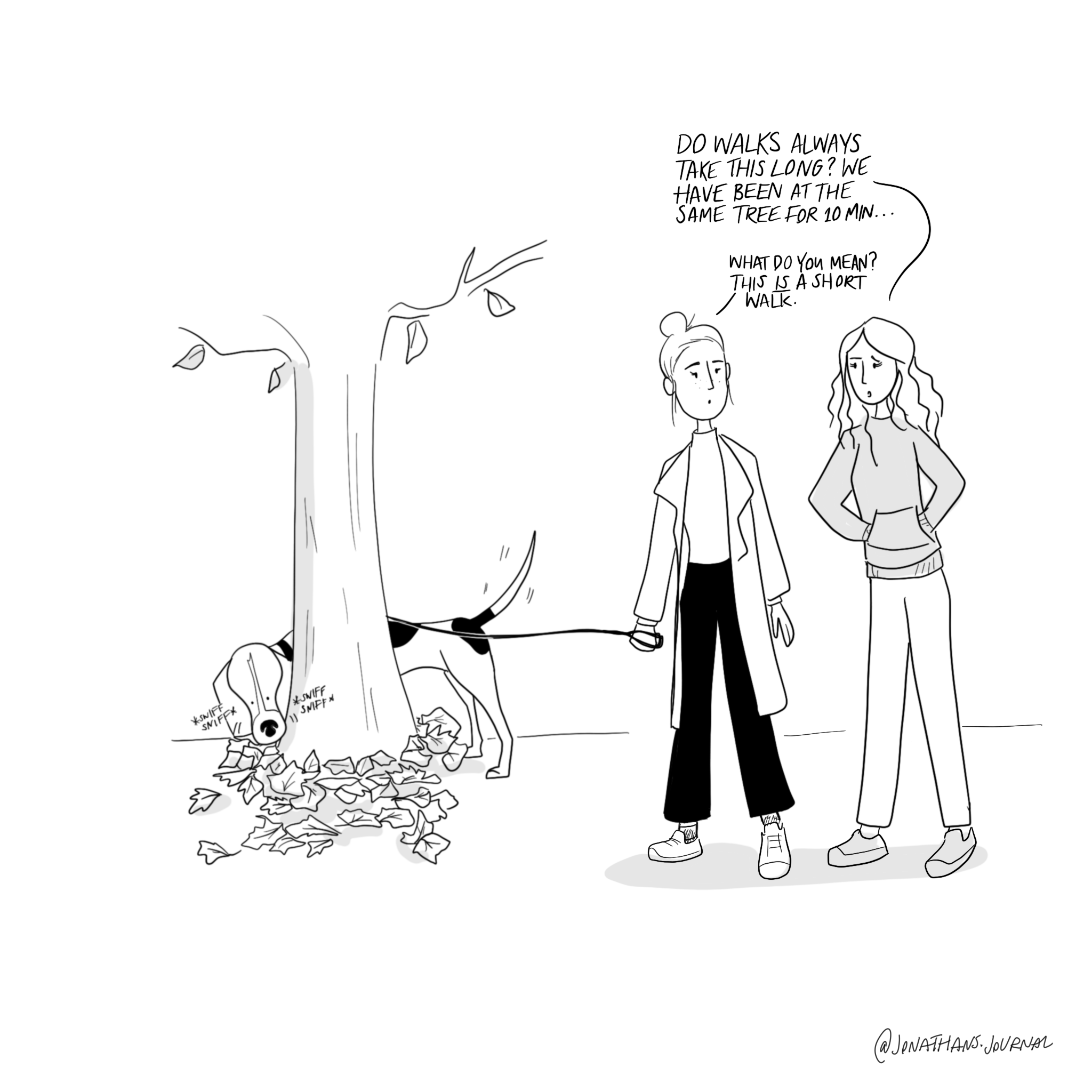Are Hounds Smart?
* Note: This piece primarily focuses on scent hound breeds such as Beagles, Basset Hounds, Foxhounds, Coonhounds, etc. rather than sight hounds (such as Greyhounds and Whippets). The term “hound” is often used colloquially for the scent hound and, due to the author’s experience in these breeds, focuses on these types of dogs.
One thing that drives me crazy as a hound dog owner is how often people will call my dog stupid to my face. “You can’t get those dogs to do anything,” people will say in passing as I’m trying to get my Foxhound/Treeing Walker Coonhound mix to move from a tree he has been sniffing for literally ten minutes. “I could never have one of those dogs,” is a remark I get from people with dogs that are considered much more obedient.
The stigma that hound dogs can’t be trained is one that sweeps the breed group, being one of the many reasons people may cite not adopting one. People generally want a dog that is easy to train (whether they actually train the dog is often a different story). Hounds, unfortunately, rarely fit into that category and it is sometimes mistakingly attributed to unintelligence. This probably happens because they are compared to other breeds, such as German Shepherds, or any other dog in the Herding Group.
Are hounds really the least intelligent of dogs?
Hound owners know better.
Science’s three types of canine intelligence
One of the world’s leading canine psychologists is Stanley Coren. Initially starting his career in human psychology and cognition, Coren shifted his career later on into canine behavior and the human-canine bond. (He did this because he loves dogs). 1
In a study for his book The Intelligence of Dogs, Coren used the results to define three different types of dog intelligence: adaptive intelligence, working intelligence, and instinctive intelligence.
1. Adaptive intelligence
Adaptive intelligence to a dog is their ability to solve problems on their own. This type of intelligence is foundational and greatly affects the other two types. This is most apparent in daily life with your dog, such as how quickly they can solve a puzzle or do multiple commands at once (sit, lay down, roll over, up!). Other examples are how some dogs are great at agility courses, or some figure out how to open the garbage can all by themselves.
2. Working intelligence
Also known as obedience intelligence or trainability, this is defined as a dog’s ability to learn from humans. This is what most people probably think of when they claim a dog is smart or not. The types of dogs that rank high on this intelligence list are just the ones you’d expect: Border Collies, German Shepherds, Poodles, etc. These dogs learn commands quickly, are biddable, eager to do whatever their human asks, and sometimes even get bored because they always need something to do.
3. Instinctive intelligence
Instinctive intelligence is a dog’s ability to perform the tasks their breed was originally bred for. Even if your dog is just a family pet and doesn't do what the breed was developed to do, this type of intelligence is really embedded in their DNA (and why you shouldn’t curb it unless you want an anxious or destructive dog). This is why so many Corgis still tend to herd small children, Great Pyrenees are naturally protective of their property, and why (you saw it coming) scent hounds will ignore you to chase a squirrel they smell a mile away.
Hound Smarts
Let’s take a common example of life with a hound dog.
You and your hound dog are in your yard. It’s been hours, so you decide it’s time to go inside. You call your hound, who is off in the farthest corner of the fence with their nose glued to the ground. You call them to come. They don’t flinch and continue to sniff that same square inch. You call them again. No response. You call a third time. Your hound looks up at you for one second, then goes back to sniffing the ground. It isn’t until you walk inside and briefly graze a plastic bag of treats that your hound has suddenly materialized beside you in the most perfect “sit”, ready to give you their paw.
Just because a hound dog does not always “come” when you ask them does not mean they don’t comprehend. Your hound thinks they are doing what they’re supposed to do: sniff that corner of the yard because there was a squirrel there once. Even if your hound isn’t prey driven (like mine), they are still using their super-powered nose to find food, friends, or whatever they feel like that day. As a result of centuries of selective breeding, hound brains are hard-wired to choose the scent over their human unless something the human does becomes more interesting (like have a treat). That in itself shows how incredible the instinctual intelligence of a scent hound is.
Just because hounds aren’t high ranking in working intelligence (they unfortunately trend lower on Coren’s working intelligence list) does not mean they are dumb dogs. Take the Covid-sniffing Beagle team, for example. They learned how to sniff the Covid-19 virus in humans in just six months with 98% accuracy. There was a reason that Beagles were enlisted for this job; they had the skills, smarts, and nose to detect the virus better than many other breeds.
The New York Post featured the Covid K-9 squad of Beagles on their visit to the NYC BARK office. Article by Hailey Eber, photo by Zandy Mangold.
Just because hounds sometimes need to be convinced to do obedience training does not mean they are untrainable. Knowing the types of canine intelligence is why I adamantly recommend that hound owners find dog trainers with hound experience (bonus points if they have a hound themself). So often, hound owners have told me that a trainer has called their dog stupid or broken because the trainer is only versed in working intelligence. If all they have trained are Border Collies and Belgian Malinois, of course they will wonder why a coonhound won’t sit unless something is in it for them. A good trainer will know how to work with a dog’s instinctive intelligence. They will be able to find ways to cater to your hound’s nose and have it work to your benefit. Basically it all whittles down to convincing the hound that your cue was their idea.
Hounds are clever enough to decide they’d rather do something else (probably sniffing) than what you are asking them to do. If you’ve had a hound long enough, you’re probably even able to attest to them being so clever that they manipulate you into whatever they want. For that reason alone, I’d say they’re pretty dang smart.
Note from the author: This information is generalized to the scent hound breeds based on what is “typical” to their behaviors. Please do not let this discourage you from thinking a hound will automatically be “stubborn” and be hard to train. As a personal anecdote, my two hounds Jonathan and Ike could not have been more different in their training journeys. While our Foxhound mix Jonathan needs a little more convincing to do things and takes longer to problem solve, our Plott Hound, Ike, was a very fast learner and eager to please. Adopted at age 10, he learned a new name and how to “sit” and “shake” within just a few months. He had previously been an outdoor hunting dog with no name – and we joked he was “feral” when he came to us with no clue of any command. We called him our “smart cookie” as he constantly surprised us with his working intelligence. He taught us old dogs can learn new tricks. However, both of our hounds have world-class sniffing skills, and could find a pizza crust on the sidewalk miles away.



